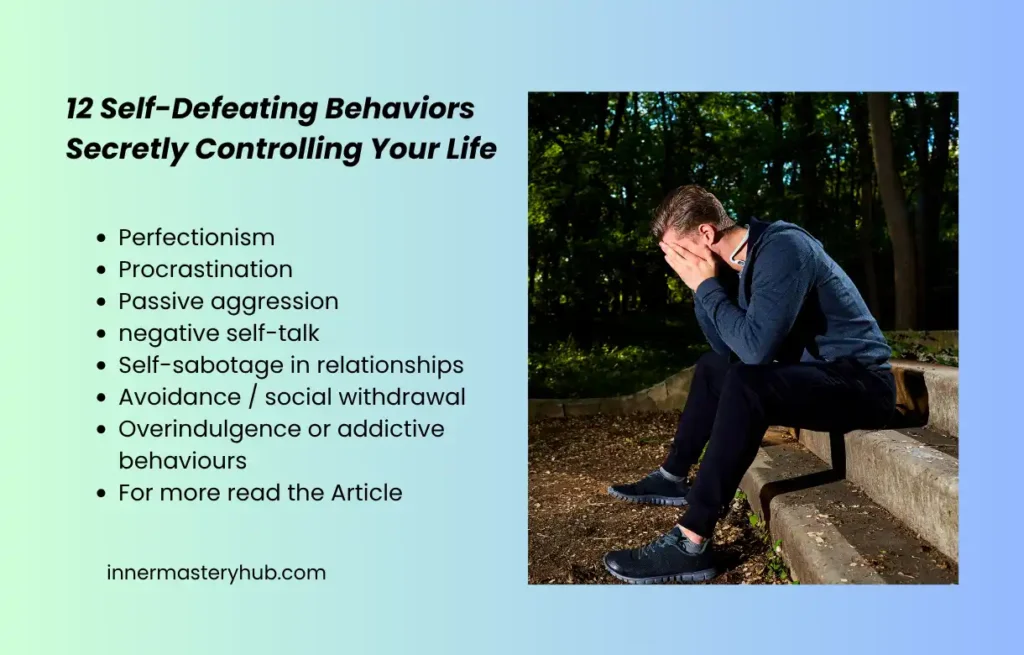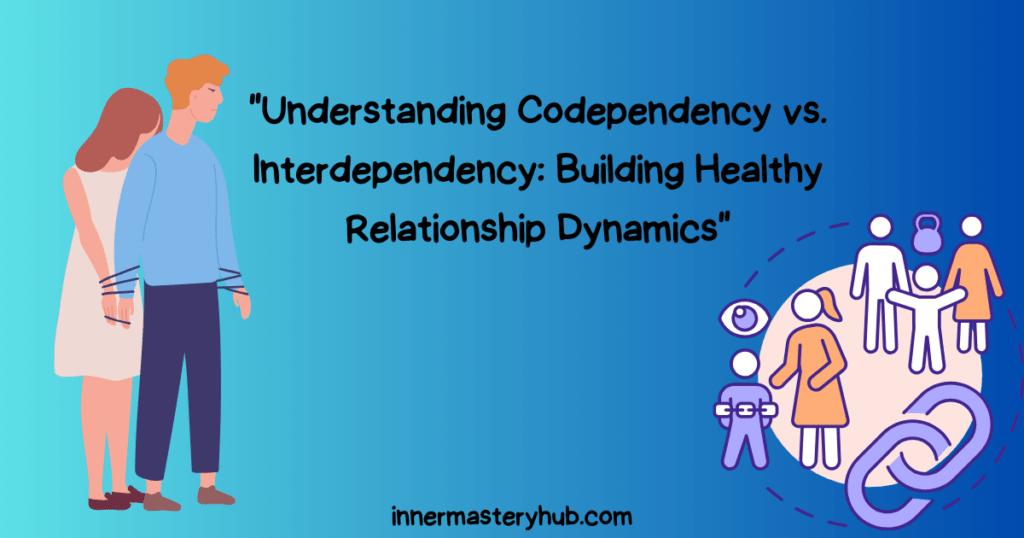Dealing With Self-Defeating Behaviours That Are Secretly Controlling Your Life
Dealing With Self-Defeating Behaviours
Self-defeating behaviours can keep you stuck in the same frustrating cycle. Start by noticing your triggers, thoughts, and habits without judgment. Replace “all-or-nothing” thinking with small, realistic steps. Set one clear goal, track progress weekly, and practice self-compassion. Consistency, support, and accountability create lasting change.

Self-defeating behaviours impede development, limit wellbeing, and keep people stuck in unfavourable patterns. Self-defeating behaviours can be the result of unspoken concerns, low self-esteem, and false beliefs.
Why dealing with self-defeating behaviours matters
Self-defeating behaviour, sometimes referred to as self-sabotage, is conduct that damages your wellbeing. Self-defeating behaviour is defined by psychology as repeated behaviour that inhibits the achievement of goals and leads to failure or tragedy.
According to one study, these activities are used as a defence against more serious anxiety or threat and have a lower reward/cost ratio (you get less benefit but a significant expense).
In the wake of these patterns, people could feel helpless. “I’ll try, but I mess up anyway,” is a common belief they hold. The emotional toll, which includes disappointment, embarrassment, and missed opportunities, increases with time.
1. Procrastination
Even when people are aware that delaying a task will harm them, they still do it. It’s called procrastination. Fear is frequently concealed by procrastination, including fear of failure, fear of being judged, and worry about not completing tasks precisely.
Studies have linked procrastination to perfectionism and a fear of failing. Among the consequences are feelings of guilt, stress, missed deadlines, and low performance. It feels like you’re chasing your own tail.
When dealing with this behaviour, divide the work into small, manageable steps. Set brief due dates, such as “just 10 minutes”, set timers, nd make your commitment in public (inform someone). Record your progress every day by following the momentum and confidence you gain in your abilities to take action over time.
2. Self-criticism and negative self-talk
Some people are hard on themselves, labelling blunders as “stupid,” “useless,” or “never good enough.” That’s self-criticism. A critical inner voice can exacerbate low self-esteem and lead to stress. According to cognitive distortion research, negative self-talk plays a fundamental role in depression and anxiety. Constant self-criticism may sap confidence, causing people to avoid taking chances.
Notice your inner critic—present proof to back up your claims (“What would I tell a friend?”). Use neutral or soft language while self-talking and maintain a log of “criticism → reframe” to cultivate a softer inner voice.
3. Perfectionism
People demand flawless performance in work, relationships, or appearance. That is perfectionism. Perfectionism masks fear: making a mistake feels intolerable. Researchers link perfectionism with burnout, suicidal thinking, and higher stress. Perfectionism can delay action (you wait until conditions are “perfect”) or create paralysis.
To overcome perfectionism, set “good enough” standards by allowing yourself to make mistakes. Practice finishing things at 80% and reflect on what “perfect” truly means.

4. Comparing yourself to others
People look at others’ success, appearance, or social media and feel inferior by comparing themselves to others. Comparison fuels envy, shame, and discouragement. In social psychology, upward comparison (comparing oneself to “better” others) can lead to depression or lower self-worth. Comparing yourself to others can steal your joy and distract you from your path.
You can limit exposure to comparison triggers (such as social media and certain circles). Pay attention to your own baseline: where you started, what small wins you’ve had. Use others’ successes as inspiration, not as a measurement.
Is self-defeating behaviour the same as self-sabotage?
Yes, most people use the terms interchangeably for patterns that undermine success or happiness.
5. Avoidance / social withdrawal
People skip social opportunities, hide, or disengage when they are stressed or fearful. Avoidance may feel safe in the short term, but it ultimately cuts off growth, support, and connection. It reinforces shame or anxiety. Isolation worsens mood, makes coping harder, and leads to a cycle of withdrawal.
Begin with small social acts, such as sending a message to a loved one or attending a local event. Use accountability (a friend to call you), pair exposure with self-compassion. Reflect on what fear lies behind the desire to withdraw.
6. Self-sabotage in relationships
People push away others, behave destructively, or provoke conflict even with loved ones. That is relational sabotage. Sabotaging stems from fear of intimacy, fear of abandonment, or the belief that “I don’t deserve love.” Sabotage creates distance, distrust, breakups, and loneliness.
Track recurring relational drama: what triggers your sabotage? Pause before reacting. Use “I feel…” statements and practice vulnerability. Seek therapy or couples communication training.
7. Excessive control/rigidity
People try to control every outcome or micromanage their lives to avoid risk. Rigidity hides the fear of unpredictability, uncertainty, or chaos. Rigidity can cause stress, burnout, and frustration when things don’t go as planned. You miss spontaneous chances.
Letting go in one small area daily (e.g., allowing a delay or accepting imperfection). Use “Plan B” tolerance. Reflect: what if the outcome differs? Learn flexibility over time.
8. Overindulgence or addictive behaviours
People lean on alcohol, gambling, overeating, compulsive shopping, or digital addiction. That is overindulgence. Research on self-defeating behaviour finds that some maladaptive behaviours serve as self-medication or an escape mechanism. Overindulgence damages health, finances, and relationships. It provides temporary relief but comes at a long-term cost.
Identify emotional triggers (stress, boredom). Replace unhealthy coping mechanisms with healthy alternatives, such as exercise, talking with a friend, or engaging in a creative outlet. Use limits, accountability, and professional support if needed.
9. Learned helplessness / giving up
People believe they can’t change, so they stop trying. That is learned helplessness. Psychological research indicates that when individuals repeatedly face failure, they may develop a tendency to expect failure and subsequently cease taking action. Giving up on locks in the face of failure prevents growth or recovery.
Start with small tasks you can succeed at. Keep a “success log.” Use “I can try this step.” Focus on effort, not outcome. Get support to rebuild belief in the possibility.
10. People-pleasing / absence of boundaries
People often say “yes” when they really want to say “no,” overcommit, or overlook their own needs to gain approval. People-pleasing stems from fear of rejection and the belief that your worth depends on others. This behaviour leads to burnout, resentment, and relationship imbalance.
Practice saying “no” in low-stakes situations. Identify your limits. Use assertive language: “I can’t take that now.” Remember: refusing requests doesn’t make you a bad person.
11. Passive aggression
People often express anger indirectly, through sarcasm, silent treatment, or procrastination, when they are resentful. That is passive aggression. Passive aggression conceals conflict; it avoids open confrontation but sours relationships. It breeds resentment, misunderstanding, and emotional distance.
Name the underlying feeling (“I feel hurt when…”). Use direct but kind communication. Practice “I prefer to say this directly rather than sabotage.” Learn emotional awareness and conflict skills.
12. Self-neglect / physical and mental neglect
People often skip sleep, ignore their health, avoid therapy, neglect rest, and disregard self-care. That is self-neglect. Neglect usually stems from the belief that “I don’t deserve care.” Neglect drains energy, worsens one’s mood, impairs the ability to act, and negatively affects one’s health.
Build minimal routines (sleep, hydration, movement). Schedule “you time” as nonnegotiable. Use small steps (5 min meditation, short walks). Track the positive effect of small acts.
Why these behaviours cluster
Fear, humiliation, unfulfilled inner needs, and skewed beliefs are common themes among all these behaviours. Avoiding vulnerability, failure, and rejection are a few coping mechanisms. Fear-based coping mechanisms, however, often fall into traps.
Self-defeating habits over time increase emotional suffering. It’s possible to feel melancholy, nervous, disempowered, or stuck. It becomes increasingly tricky to disrupt patterns the more frequently they occur.
Research from the mental health domains indicates that recurring self-defeating behaviours (such as addiction, avoidance, and self-criticism) are strong indicators of anxiety, despair, and unfavourable life outcomes.
Dealing with self-defeating behaviours
Step 1: Awareness
Keep a journal. Note each time you catch one of the 12 behaviours. Write trigger, what you did, what you felt.
Step 2: Pause before reacting
When you sense a habit kicking in, insert a pause (even 5 seconds) to think: “Is this behaviour helping or hurting?”
Step 3: Replace with an alternative
Have healthier options ready. If you have an urge to overeat, go for a walk. If you feel the urge to self-criticise, speak gently.
Step 4: Small wins
Start with behaviours you feel you can shift (e.g., people-pleasing). Each success builds confidence.
Step 5: Cognitive work
Challenge core beliefs (“I must be perfect” → “I can be good enough”). Rewrite the inner rules to be more compassionate.
Step 6: Community & support
Talk to trusted friends, mentors, or therapists. An external perspective helps interrupt hidden cycles.
Step 7: Be patient and persistent
Patterns took time to form; they take time to change. Expect setbacks; use them as data, not as a source of guilt.
What are examples of self-defeating behaviours?
Procrastination, people-pleasing, staying in harmful relationships, quitting too early, overcommitting, or rejecting help.
Putting this into everyday life
Let’s say your goal is to create a book. You fear that your writing is poor when you wake up. You put things off (Behaviour 1). After that, you perform more duties while critiquing yourself (Behaviour 2). Behaviours include demanding perfection (Behaviour 3) and comparing yourself to the best authors (Behaviour 4).
withdrawing from critique groups (Behaviour 5), sabotaging a meeting with the publisher (Behaviour 6), trying to control every detail (Behaviour 7), distracting yourself with binge-watching (Behaviour 8), occasionally feeling like “why bother?” (Behaviour 9), accepting other people’s tasks rather than writing your own (Behaviour 10), displaying passive hostility regarding deadlines (Behaviour 11), and neglecting your sleep or exercise (Behaviour 12).
Each behaviour fuels the next. The solution is not magical, but relatively steady work: you catch one behaviour, insert a better response, celebrate progress, and build new neural habits.
Take away
Self-defeating behaviours are quiet tendencies that prevent you from reaching your objectives. Procrastination, self-criticism, perfectionism, comparison, avoidance, relationship sabotage, rigidity, overindulgence, learnt helplessness, people-pleasing, passive aggression, and self-neglect are some of the twelve traits I mentioned, and they are present in many people’s lives. These actions are motivated by misguided ideas, shame, and fear.
By being conscious, stopping, rephrasing, adjusting your routines, and seeking help, you can initiate the shift. Little actions taken repeatedly over time lead to change.
You deserve to break free from these hidden traps. Start today by naming one behaviour you’ll observe in yourself—and use one small replacement strategy. Over time, you reclaim your energy, clarity, and freedom.
Frequently Asked Questions about Dealing with Self-Defeating Behaviours.
What are self-defeating behaviours?
Self-defeating behaviours are acts or ways of thinking that harm one’s own aspirations and wellbeing. These behaviours include self-sabotage, avoidance, perfectionism, negative self-talk, and procrastination. These behaviours keep people from living fully, succeeding, and preserving healthy connections and are usually the result of fear, low self-esteem, or unresolved trauma.
Why do people develop self-defeating behaviours?
During times of stress or trauma, self-defeating behaviours frequently develop as coping strategies. People may unintentionally adopt these behaviours as a form of self-defence or comfort. They eventually grow into deeply ingrained behaviours that limit development.
How do self-defeating behaviours affect mental health?
Self-defeating actions increase sadness, anxiety, and stress. Persistent self-defeating undermines self-esteem and produces a vicious cycle of regret, guilt, and despair. Additionally, they may push unhealthy coping mechanisms, including substance misuse and social disengagement. R
What are examples of self-defeating behaviours?
Procrastination, perfectionism, overanalysing, negative self-talk, people-pleasing, self-isolation, avoiding problems, and addictive habits are examples of common self-defeating behaviours. These behaviours build obstacles to development and achievement. The first step in replacing unhealthy coping mechanisms that increase self-assurance, efficiency, and mental wellness in day-to-day living is acknowledging these actions.
How to change self-defeating behaviors?
Awareness, introspection, and deliberate change are necessary to overcome self-defeating behaviours. Identifying triggers, engaging in self-compassion exercises, setting reasonable goals, and developing healthy coping strategies are key steps.
Positive affirmations, journaling, mindfulness, and therapy can all be beneficial.
Are self-defeating behaviours linked to childhood experiences?
Indeed, many self-defeating behaviours have their roots in early life. Fear of failure or rejection can be ingrained in children who grow up in circumstances that are critical, uncaring, or have irrational expectations. These tendencies continue as unhealthy coping strategies into adulthood.
What is the first step to stopping self-defeating behaviours?
The first step to stopping self-defeating behaviours is awareness. Recognise patterns that hinder your progress and identify the emotions behind them. Journaling, mindfulness, and honest self-reflection can help. Once acknowledged, gradually replace them with positive habits that align with goals, fostering self-compassion and long-term personal transformation.
How to overcome self-defeating personality disorder?
Self-defeating patterns improve with therapy and daily practice. Work with a psychologist (CBT, schema therapy, or DBT) to challenge “I deserve less” beliefs, stop rescuing others at your expense, and build self-respect. Track triggers, replace self-criticism with realistic self-talk, and set small boundaries weekly.






